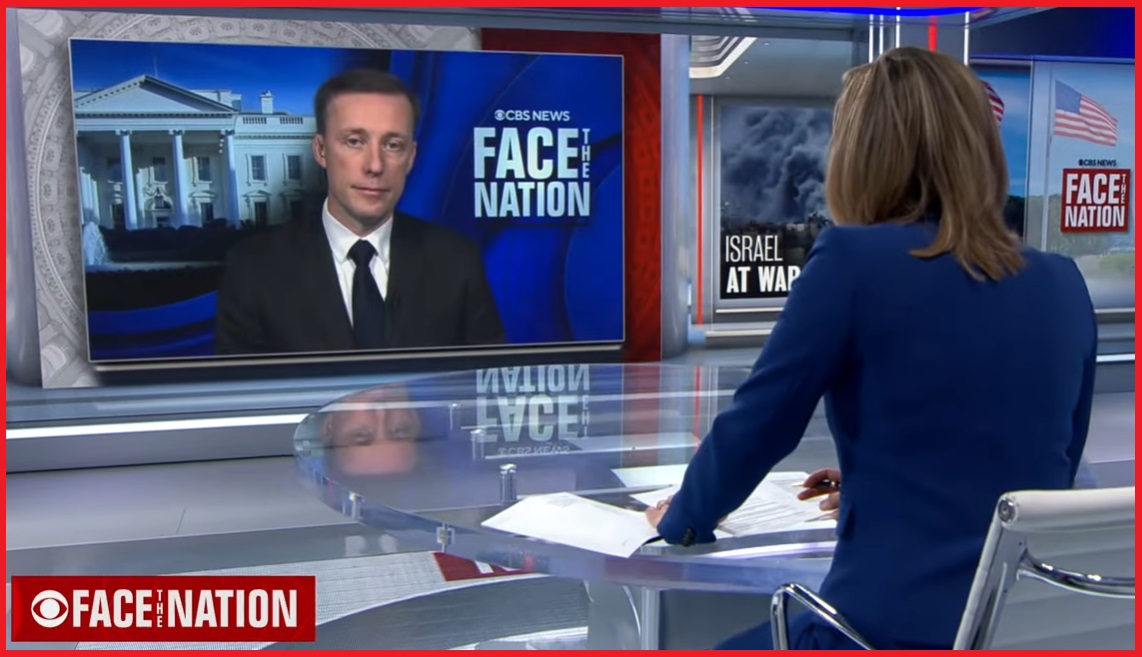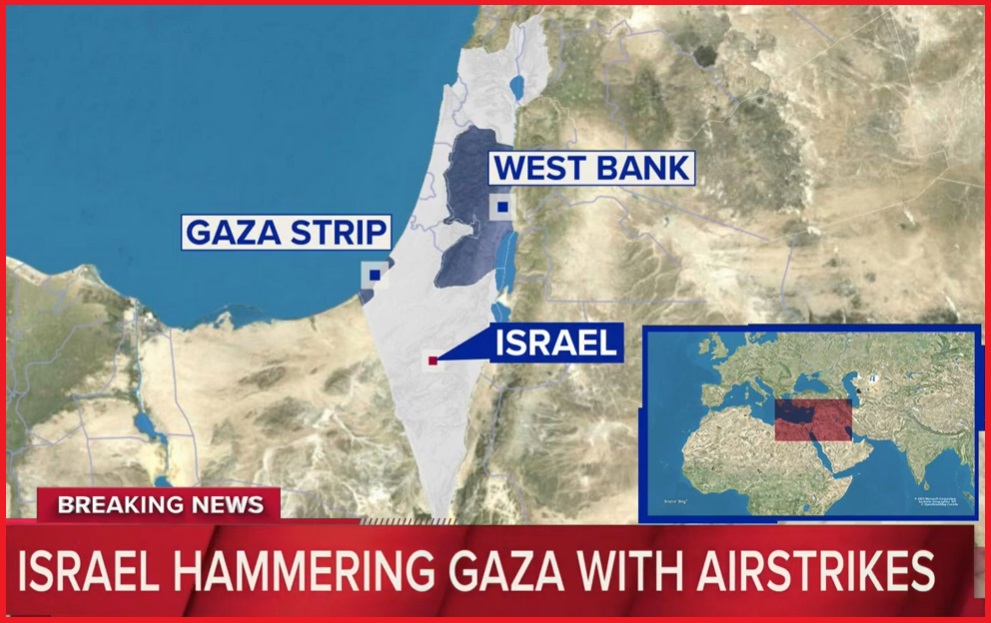


There has been much banter about 500 to 600 Americans who are currently in Gaza and the need to evacuate them. Let us not pretend. Any American who intentionally took part in Palestinian civilian life in Hamas led Gaza, did so knowing they were living within a population controlled by terrorists. It should not be the position of the U.S. government to avert people from the consequences of their adult decisions.
Has anyone ever noticed that when Democrats are in power, the world ends up in perpetual glob-skipping crisis. National Security Advisor Jake Sullivan appears on CBS to discuss the current security risks within Gaza as the Israeli’s begin the difficult challenge of wiping out the Hamas terrorists. Both Sullivan and pearl-clutching Brennan pretend the Palestinian people do not support their terrorist leaders. WATCH (Transcript Below):
[Transcript] MARGARET BRENNAN: We go now to White House National Security Adviser Jake Sullivan. Jake, I want to get straight to it. This is going to be very brutal urban warfare when Israel moves into Gaza. How much time do you have to get the 500-600 Americans trapped there out?
WHITE HOUSE NATIONAL SECURITY ADVISER JAKE SULLIVAN: Well, Margaret, we’re in daily, indeed, hourly contact with our counterparts in the Israeli Defense Forces and security services. And we’re talking to them about their plans for moving in on the ground in Gaza. It’s not for me to say what their timetable is. I think they will need to speak to that. But we are very focused on, first, as you said, making sure that all American citizens in Gaza have safe passage out of Gaza and into Egypt. We’re working on that around the clock, we’re not going to rest until that happens. And second, we’re very focused on making sure that the broader civilian population of Gaza, because the vast majority of Palestinians in Gaza have nothing to do with Hamas, that they can get to safe areas, that they can get access to food, water, medicine, shelter, and that they can be protected from the fighting as it intensifies and as a potential ground operation moves forward.
MARGARET BRENNAN: If any of those Palestinian civilians are permitted to leave Gaza, does the United States have assurances from Israel that they will eventually be allowed to return to their homes? Or will they just become refugees?
SULLIVAN: We are not at the point of discussing the operational details of people, the larger civilian population leaving Gaza. We’re focused right now on getting them to safe areas, not in the north of Gaza, but down in the south of Gaza. In terms of the larger question of whether those who leave can return, the United States has a very simple proposition on this: it’s when people leave their homes in conflict, leave their houses in conflict, they deserve the right to return to those homes- to those houses. And this situation is no different.
MARGARET BRENNAN: The United States deployed a second aircraft carrier to the eastern Mediterranean. I’m wondering if you have new intelligence that shows that the threat from Iran is growing.
SULLIVAN: We don’t have some specific new intelligence that the threat is different today from yesterday. The threat yesterday was real. The threat today is real. There is a risk of an escalation of this conflict, the opening of a second front in the north, and of course of Iran’s involvement- that is a risk. And that’s a risk that we have been mindful of since the start. It’s why the President moves so rapidly and decisively to get an aircraft carrier into the eastern Mediterranean, to get aircraft into the Gulf, because he wants to send a very clear message of deterrence to any state or any actor that would seek to exploit this situation. And he said it best when he spoke last week, in the- in the aftermath of this brutal and vicious terrorist attack to any state that would think about doing this: don’t.
MARGARET BRENNAN: Well, Iran’s foreign minister put out a public statement saying that Iran cannot remain a spectator. What does that mean to you? Are you concerned about proxy forces? Are you concerned that the State of Iran is getting drawn in?
SULLIVAN: Well, first, we are concerned about proxy forces. Lebanese Hezbollah, a proxy force of Iran, is there, a raid on Israel’s northern border with considerable military capacity and a history of attacking the State of Israel. And in fact, we have seen in the last few days skirmishes across that northern border that only enhances the risk of escalation. But of course, we can’t rule out that Iran would choose to get directly engaged some way; we have to prepare for every possible contingency. That’s exactly what the President has done. That is part of what has motivated the President’s movement of these assets, to send that clear message of deterrence to make clear that this war should not escalate, and that no other actor should seek to exploit this situation.
MARGARET BRENNAN: Is there diplomatic outreach to Iran right now?
SULLIVAN: We have means of communicating privately with Iran. And we have availed ourselves of those means over the past few days to make clear privately that which we have said publicly.
MARGARET BRENNAN: When it comes to the Israeli forces moving into Gaza, do you have a definition of success from the Prime Minister?
SULLIVAN: The definition of success ultimately will be the long term safety and security of the Jewish state and the Jewish people. And what that means is their ability to eliminate the threat that Hamas poses to Israel. That is the definition of success that they have set out, that is what they are working for in trying to take out the terror infrastructure in Gaza. They are working through that, as they have said, through the aerial campaign and ultimately they are looking at operations on the ground and otherwise to try to effectuate that outcome.
MARGARET BRENNAN: But there are 2 million Palestinians living there who, as you said, many of whom have absolutely nothing to do with Hamas. So at this point, are you expecting Israeli military forces to occupy that area long-term? Who steps in and governs if Hamas is routed out?
SULLIVAN: These are important long term questions to begin asking and grappling with today. We believe that Israel is grappling with them, we are talking to them about them. I’m not going to share the details of those private conversations. But what I will say is, right now, the focus of the Israeli operation is on that terrorist infrastructure in Gaza. And I’m not going to speak to some of these longer term questions at this time, even as we are grappling with them. I will say, though, that it is absolutely critical, as President Biden said from the very beginning, that we as fellow democracies, the US and Israel, that we embrace the rule of law and the laws of war, and the United States will work with Israel, the United Nations, Egypt, Jordan, and other countries, to do all that we can to ensure the protection of civilians and that those civilians have access to the basic necessities of food and water, of shelter, of medicine. That is a priority of ours, in the hours and days ahead, excuse me, in the hours and days ahead.
MARGARET BRENNAN: And the targeting of that kind of basic infrastructure is potentially a war crime, is it not?
SULLIVAN: Look, I’m not going to react to or comment on every report that we see. There’s a lot of fog of war. What we will say is the protection of civilians and the protection of those people who are trying to get to safety, as well as their ability to access food, water, medicine, shelter, these things should be respected and should very much be a central focus of everyone involved in this, including ourselves, the Israelis, the United Nations, and the regional countries.
MARGARET BRENNAN: The Palestinian Authority, a long time ago, renounced violence. I saw President Biden spoke to Mahmoud Abbas yesterday. Is your expectation that the Palestinian Authority would potentially govern Gaza? And how concerned are you that violence will spread in the West Bank?
SULLIVAN: Look, again, I think you’re asking a very important question about the long term in Gaza. What I will say is this: Gaza being governed by a brutal and vicious terrorist organization, is not just a challenge for the State of Israel. It’s a challenge for the Palestinian people, because Hamas does not represent their highest aspirations. Hamas is not looking out for, caring one iota about their welfare and well being. So the Palestinian people in Gaza do deserve a leadership that allows them to live lives in peace and dignity and security. What that exactly looks like going forward. I’m not in a position to say today, but it is the right question to be asking now, as this unfolds, because we have to think not just about the immediate term, but about the long term too.
MARGARET BRENNAN: Jake, what do Americans need to be bracing themselves for in the coming days?
SULLIVAN: Well, first, the American people have already been through something here not in simply watching this brutality, this barbarism unfold. Of course, that’s nothing compared to what the Israeli people have suffered the worst massacre of Jews since the Holocaust. But the American people are personally affected by this too. And you’ve seen it in the outpouring of grief, of solidarity of sympathy for those innocents who lost their lives. In the days ahead,the American people will, of course, be watching closely to see whether or not this conflict escalates. And the United States government, the Biden administration, our President is doing everything he can to ensure that does not happen, that this conflict is contained to Gaza does not expand beyond that. And that Israel can succeed in rooting out the terrorist infrastructure of Hamas, while the United States works with others to protect the welfare of the innocent Palestinian civilians in Gaza.
MARGARET BRENNAN: This is not the only crisis you’re dealing with. There’s still a land war in Europe. You said just a few days ago to congressional leaders that US aid to Ukraine was running dangerously low. That, as there’s a renewed offensive. How close to crisis are we on that front?
SULLIVAN: We can continue to sustain deliveries of critical ammunition for them to defend against that Russian offensive and continue pressing forward in other areas in Ukraine. And you’re right, Margaret, that Russian offensive is very much underway. The Russians are throwing a lot at the Ukrainians in the northeast, in the east, and we need to make sure that we continue rushing necessary military supplies to them. We’re doing that. But we need Congress to act. And the President has made clear that he is going to go to Congress with a package of funding for Ukraine as well as continued support for Israel. You can expect intensive engagement with Congress this very week, as we work on such a package and seek to secure bipartisan support for it.
MARGARET BRENNAN: And that’s a $2 billion package that would bundle Ukraine, Israel, the border, support for Taiwan altogether.
SULLIVAN: Well, the number is going to be significantly higher than that. But it will, as I said, certainly include the necessary military equipment to defend freedom, sovereignty and territorial integrity in Ukraine, and to help Israel defend itself as it fights its terrorist foes.
MARGARET BRENNAN: Jake Sullivan, National Security Adviser to the President. Thank you for your time today.
SULLIVAN: Thanks for having me.

